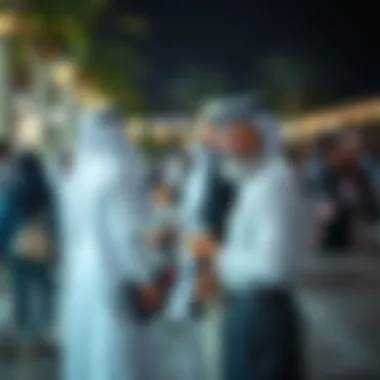UAE National Holidays 2023: A Complete Guide


Intro
As the United Arab Emirates approaches the year 2023, understanding the national holidays becomes increasingly relevant, transcending mere dates on a calendar. For expatriates, investors, and residents, these holidays are not just opportunities for celebration; they can also trigger significant shifts in the real estate landscape and lifestyle choices. Recognizing the underlying cultural significance and the practical implications of these holidays is essential for anyone looking to navigate the vibrant tapestry of the UAE.
Every holiday resonates with the spirit and traditions of the Emirati people, offering insights into their values and social dynamics. Additionally, for those with an eye toward investment, these days can illuminate emerging market trends and investment opportunities. As this article unfolds, we will delve into the key holidays of 2023, explore their cultural meanings, and examine how they may influence both personal and investment decisions in Dubai.
The depth of interaction among communities during these celebrations invites a deeper understanding of how each holiday can impact daily life and market dynamics. Let’s embark on this journey through the festivities and uncover their broader implications for investors and residents alike.
Preamble to UAE National Holidays
UAE National Holidays hold a special place in the hearts of residents and citizens alike, acting not only as reprieves from daily routines, but also as profound celebrations of identity and culture. Understanding these holidays provides insight into the values and traditions that define the UAE's vibrant society. By grasping the significance of each holiday, from commemorations steeped in history to festivals that celebrate religious tenets, stakeholders can navigate the complex social landscape with greater ease.
The year 2023 is marked by a challenging yet exciting array of holidays that not only invite relaxation and celebration but also present opportunities for investment and growth. Differentiating between public holidays and intricate cultural observance can be vital, especially for expatriates and investors, as these days greatly impact community engagement and economic activities.
Historical Context
The historical backdrop of UAE National Holidays is woven together with threads of tradition and modern development. The establishment of the UAE as a federation in 1971 brought a newfound sense of unity and purpose, leading to the recognition of holidays that reflect the nation’s shared values. Initial observances focused primarily on the formation of the union, its leaders, and pivotal events that shaped the state. For instance, national days are commemorative of critical moments when the emirates came together, reflecting resilience and solidarity.
Each holiday typically has its roots delving into Islamic history or Emirati culture. For example, the religious holiday of Eid al-Fitr celebrates the end of Ramadan, while many Emirati holidays signify the nation’s journey towards modernity. Knowing these histories can provide invaluable context for anyone looking to understand the intricate layers of UAE culture during these times.
Cultural Significance
National holidays in the UAE are more than mere days off; they represent a time for collective reflection, joy, and cultural expression. Each holiday often involves unique customs and rites that embody national pride and respect for traditions. Celebrations reflect environmental diversity in the UAE, where urban living coexists with rich Bedouin customs.
Take Eid al-Adha, for instance; it is not only a moment for prayer and family gatherings, but also encompasses charitable acts and sharing with those in need, reinforcing community bonds. Furthermore, holidays like UAE National Day serve as platforms for showcasing artistic performances, traditional dances, and culinary delights, drawing from the rich heritage of each emirate.
In essence, recognizing the cultural significance of these holidays can amplify the experience for expatriates and residents, creating a deeper connection with the land and its people. For investors, appreciating these values might lead to more informed decisions, particularly in sectors like retail and tourism where observances ignite increased consumer activity.
"Understanding the interplay between national celebrations and economic activities is crucial for any stakeholder keen on the UAE market."
Navigating these holidays effectively demands an appreciation of their historical roots and cultural relevance, guiding informed participation in the lifestyle and economic opportunities that accompany them.
Overview of National Holidays in
The national holidays in the UAE serve as both a cultural tapestry and a calendar of significance, weaving together history, tradition, and community celebrations. For residents and expatriates alike, understanding these holidays in 2023 holds paramount importance not just from a cultural perspective but also for practical aspects concerning planning and lifestyle adjustments.
National holidays provide a unique opportunity for individuals to take a break from their routines. They foster social bonds as families and friends gather to celebrate and engage in meaningful activities. Understanding the public holidays in advance helps in scheduling vacations, planning events, and engaging with local customs. For those looking to invest in the real estate market, the timing of these holidays can significantly influence property values and rental demand. In essence, knowing the layout of national holidays affords people in the UAE a strategic advantage in both personal and professional arenas.
Public Holidays Schedule
The public holidays in the UAE for 2023 are crucial touchpoints on the calendar. These observances can shift based on the lunar calendar, especially the Islamic holidays, which adds an element of unpredictability. Residents should keep a keen eye on announcements from the UAE government, as these dates can affect family outings, travel plans, or even business strategies. Here’s a rough outline of the major holidays you can expect this year:
- New Year's Day – January 1, 2023
- Isra and Mi'raj – expected on February 18, 2023 (subject to the sighting of the moon)
- Eid al-Fitr – expected at the end of Ramadan in April 2023
- Eid al-Adha – anticipated around June 28, 2023
- Commemoration of the Martyrs – November 30, 2023
- UAE National Day – December 2, 2023
While the list provides a general framework, the exact holidays may shift slightly based on moon sightings. Therefore, keeping track of governmental updates becomes imperative for planning ahead.
Extended Weekends and Their Implications
Extended weekends are one of the key benefits of national holidays, particularly for those who work in the UAE. With certain public holidays falling adjacent to weekends, residents can relish extended periods of leisure. This has substantial implications for various sectors including retail, tourism, and even transportation.


For instance, when holidays like Eid al-Fitr follow a Friday, many enjoy a four-day weekend, creating a spike in local tourism as families embark on short trips or enjoy experiences in nearby attractions. The hotel and hospitality sectors see increased demand during these times, potentially translating to better offers for investors considering properties in tourist hotspots.
Moreover, extended weekends provide an opening for community events and festivals, as businesses ramp up promotions and initiatives to engage residents. This fosters not just economic benefit but also engenders a spirit of togetherness among communities, revealing the social fabric of the Emirates.
National holidays, particularly those leading to extended weekends, are a golden opportunity for enhancing your engagement with the local culture, business activities, and even networking.
In summary, a comprehensive understanding of the public holidays and extended weekends in 2023 illuminates the path for residents and investors alike. This knowledge allows for better emotional and economic investments in the vibrant tapestry that is the UAE.
Key National Holidays and Their Importance
National holidays in the UAE serve as a reflection of the nation’s heritage, culture, and values. They are not just days off work; they offer an opportunity to honor traditions and showcase the collective spirit of the community. Understanding these holidays can provide key insights into the rhythm of life in the UAE, especially for investors and expatriates, as they influence social, economic, and cultural dynamics.
The importance of these holidays extends beyond just celebration, as they can impact various sectors like real estate and tourism. National holidays often translate to increased consumer activity, driving demand in retail and hospitality, which is crucial for investors to consider when making decisions.
New Year's Day
Celebrations and Traditions
New Year's Day is celebrated on January 1st, and it’s a day marked by various festivities across the UAE. Families typically gather for large meals, fireworks light up the skyline in cities like Dubai, and parties abound as people ring in the new year with joy and hopes for the future. This celebration is characterized by its inclusivity in the UAE, where residents from diverse backgrounds come together, making it a unique bonding experience.
Moreover, the traditions can vary widely. For instance, many people take this opportunity to reflect on their accomplishments of the past year and set New Year's resolutions. This aspect not only draws individuals closer to their families but also creates a broader sense of community. It’s considered a beneficial tradition because new beginnings are embraced, bringing with them the hope of prosperity and betterment for the year ahead.
Impact on the Real Estate Market
The New Year holiday typically sees a surge in consumer interest in the real estate market. Many individuals consider starting fresh by investing in new properties or upgrading their current living arrangements. This period also can lead to increased sales of luxury apartments in Dubai and other emirates, as expatriates look to secure homes that match their aspirations.
The unique feature of this day is how it opens opportunities not just for individual buyers but also for developers and real estate agents. They often launch new projects, targeting buyers who want to make a move at the beginning of the year. While this can create short-term boosts in the market, investors should be cautious; maintaining realistic expectations during holiday spikes can be paramount.
Isra and Mi'raj
Religious Observances
Isra and Mi'raj is an important day in the Islamic calendar, commemorating the night journey of the Prophet Muhammad. Observance is typically characterized by prayer and reflection among the Muslim community. This day serves as a reminder of faith and devotion, and is often marked by people attending special mosque services to deepen spiritual connections.
The significance of this day lies in its ability to unify the community in spirituality, making it a popular choice for gatherings and religious discussions. Reflective practices on this day encourage a deeper understanding of Islamic teachings, fostering community bonds and spiritual resilience.
Unique Activities Associated with the Day
On Isra and Mi'raj, various unique activities often take place. Mosques may hold open days, inviting non-Muslims to learn about Islam, which promotes communal harmony and understanding. Other individuals take part in charity events symbolizing compassion and generosity, aligning with the teachings of the Prophet.
The distinguishing feature of these activities is their inclusivity. Engaging people of diverse backgrounds helps create a sense of belonging, benefiting societal relationships. However, the observance is usually quiet, which might limit commercial expansion during this period; businesses must navigate carefully to respect the solemn nature of the day.
Eid al-Fitr
Festivities and Cultural Practices
Eid al-Fitr marks the end of Ramadan, and it is celebrated with great joy and large gatherings. Families prepare intricate meals, visit friends and relatives, and exchange gifts. The day often begins with a special prayer session at mosques, followed by visits to cemeteries to honor deceased loved ones, emphasizing the community's respect for memory and spirituality.
Cultural practices can involve giving Zakat, a form of almsgiving, which reinforces the values of charity and compassion within the community. By celebrating together, people foster bonds, thus enhancing social cohesion. Festivities such as feasts and fireworks bring everyone closer than ever, making it a widely anticipated holiday.


Potential Opportunities in Retail and Hospitality
Eid al-Fitr greatly influences the retail and hospitality sectors. The holiday sees a significant rise in consumer spending on gifts, clothing, and food, causing a boom in sales for retailers. Hotels and restaurants often host special promotions and events, attracting families looking to celebrate the occasion.
The appeal of this holiday is that it can create a consistent wave of opportunity for businesses willing to capitalize. However, the frenetic rush necessitates businesses to strategize and prepare well in advance to meet consumer expectations effectively. Understanding this holiday's commercial potential is crucial for investors looking to dive into the local market.
Eid al-Adha
Significance of the Holiday
Eid al-Adha, known as the
Cultural Activities During National Holidays
Cultural activities during national holidays play a pivotal role in bringing communities together in the UAE, showcasing a rich tapestry of traditions, arts, and shared experiences. These events serve not only as festivities but also as a reflection of the nation’s cultural identity and diversity. For expatriates, particularly, participating in these celebrations offers a unique glimpse into the cultural fabric of the UAE and an opportunity for deeper social integration. The dynamic nature of these cultural activities often evolves, driven by the intersections of tradition with modern influences, thereby enriching the experience for both residents and visitors alike.
Community Events
Community events are the backbone of cultural activities during national holidays in the UAE. These events serve various purposes, including fostering community spirit, enhancing social bonds, and celebrating cultural heritage. During holidays like Eid al-Fitr and UAE National Day, these gatherings overflow with activity and enthusiasm, often transforming public spaces into vibrant hubs of cultural exchange.
- Festivals and Fairs: Local neighborhoods often organize festivals that include food stalls, traditional music, and art exhibitions. Such events allow families to gather and celebrate together, promoting a sense of unity.
- Workshops and Art Exhibitions: Both Emirati and expatriate communities hold craft workshops where participants can learn traditional skills like embroidery or pottery. This not only preserves cultural practices but also allows for personal connections within the community.
- Sporting Events: Sports events during national holidays encourage community participation. These can range from friendly football matches to traditional camel races, catering to diverse interests.
Community events reflect the heart and soul of the UAE’s culture, making them essential during these festive times.
Participating in community events fosters interpersonal relationships and creates a shared sense of belonging, bridging gaps between nationalities. It is also an excellent avenue for investors and stakeholders to understand different cultural dynamics, fostering better business relationships.
Traditional Celebrations
Traditional celebrations in the UAE during national holidays offer a rich experience that highlights the country’s heritage. These events are steeped in customs that have been passed down through generations, offering a unique opportunity for everyone to engage with the UAE's rich history. The blend of tradition with modernity makes these celebrations particularly attractive.
- Cultural Performances: Folk dances such as Al Ayalah and performances of traditional poetry are common sights during holidays. These performances not only entertain but also educate attendees about Emirati history and values.
- Cuisine Festivals: Food is central to any celebration in the UAE. Traditional dishes such as Harees and Majboos are prepared in abundance during holidays, inviting people to share meals and stories, reinforcing the community bond.
- Exhibits and Demonstrations: Many places host traditional demonstrations such as falconry or dhow building, giving vistas into the UAE's past and showcasing the skills that have shaped its culture.
In essence, traditional celebrations during national holidays do more than celebrate the moment; they ensure that culture is preserved and celebrated. For investors and business professionals, understanding these cultural frameworks can inform how they engage with the communities they wish to serve.
Economic Impact of National Holidays
Understanding the economic ramifications of national holidays in the UAE is paramount for investors, expatriates, and residents alike. These holidays create not only a break from work but also a unique opportunity for various sectors of the economy. Particularly, the days surrounding these holidays can stimulate consumer spending, bolster tourism, and create a ripple effect impacting multiple industries. Grasping these dynamics helps stakeholders anticipate market shifts, ensuring they make informed decisions.
Retail and Hospitality Boom
The retail sector tends to see a significant surge in sales during national holidays. The festive atmosphere encourages consumers to splurge, as families and friends gather to celebrate. Stores ramp up promotions, enticing shoppers with discount offers and exclusive products. This boosts foot traffic, particularly in major shopping areas like The Dubai Mall and Mall of the Emirates.
Additionally, many residents and visitors make a point to dine out, propelling restaurant revenues during holiday weekends.
- Visitations Surge: National holidays attract not just locals but tourists who revel in the unique celebrations and shopping experiences. This surge can result in higher hotel occupancy rates and a corresponding boost to local businesses.
- Promotions and Discounts: Retailers and restaurants often design specific holiday promotions. Such strategies wouldn't just enhance customers' experiences but encourage greater spending.
"During Eid al-Fitr, dining establishments often prepare special menus, and boutiques feature unique items that resonate with the holiday spirit, increasing their sales significantly."
This boost in the retail and hospitality sectors reflects a symbiotic relationship. The more visitors that come in, the more local businesses prosper, creating a win-win scenario. Essentially, the national holidays are like a shot in the arm for the economy, pouring vitality into the retail and hospitality landscape.


Real Estate Opportunities
For those in the real estate market, national holidays present distinct opportunities. The combination of increased disposable income and vibrant local events attracts potential buyers and renters to the UAE. The push for new developments during these times is indicative of the market's response to heightened demand.
- Open House Events: Developers often schedule open house events coinciding with holidays to take advantage of the influx of visitors. Showcasing properties during this time can lead to quicker sales or rentals, hastening transactions that might otherwise take longer.
- Investment Spree: Investors keen on the real estate market may find holiday periods ideal for making strategic investments. Increased consumer confidence can mean higher property values, rendering investments more appealing.
- Community Engagement: The sense of community during these holidays fosters an atmosphere conducive to real estate transactions. Potential buyers might envision themselves living in a neighborhood that celebrates these cultural moments.
This intricate relationship between national holidays and the real estate market is crucial. Not only do these occasions create immediate economic opportunities, but they also shape the long-term landscape of property investments.
Considerations for Residents and Investors
Understanding the national holidays in the UAE isn't just about enjoying time off; it’s vital for residents and investors alike. These holidays not only mark significant cultural and religious events but also influence various economic factors, including travel patterns and business operations. As such, grasping these considerations can inform better decisions for both personal and professional engagements during holiday periods.
Travel and Traffic Patterns
During national holidays, travel patterns in the UAE undergo noticeable shifts. Many residents seize these days as an opportunity for local travel or short getaways beyond the bustling cities. Consequently, this increased movement impacts traffic significantly. Roads can become congested, especially leading up to holidays like Eid al-Fitr and National Day, when families and individuals are more likely to hit the road.
- Timing is Everything: Planning a trip? Keep in mind that departure times may correlate with peak traffic. Early morning or late at night travel can save time and frustration.
- Public Transport Boosts: During holidays, public transportation often sees a surge in ridership, making it a convenient option for those wanting to avoid the road chaos.
- Local Destinations in Demand: Tourist attractions and local hotspots get busier than a bee hive. If you own property or run a business in these areas, brace for potential surges in clientele but also prepare for the influx of traffic complications.
Understanding these nuances can help investors, especially in the real estate sector, anticipate which properties might rise in demand during holiday seasons.
Working Days Adjustments
The UAE’s national holidays involve alterations to the typical work week, which has implications that go beyond losing a few office days. The adjustments can positively or negatively impact business operations, depending on your sector.
- Flexible Working Hours: Some companies modify working hours during holidays, allowing for longer breaks or early finishes which may favor productivity but could disrupt schedules. Communicating these adjustments well can prevent confusion.
- Market Dynamics: The slow pace of business can lead to opportunities for planning, training, and strategizing. For investors, it’s a chance to reassess investments and explore new avenues when regular business may come to a halt. This moment can be ideal for landlords or property managers to prepare for upcoming rents or lease renewals.
- Employee Morale: A break from the usual grind during holidays can positively affect employee morale. Happy employees often lead to higher productivity once the holidays are over, making this a win-win for businesses.
In summary, comprehending travel and traffic patterns along with the working days adjustments during national holidays promotes informed decision-making.
Navigating these aspects provides residents and investors concrete advantages in maximizing their engagement within the community and capitalizing on the market dynamics at play.
"Understanding local customs and timings is crucial for expatriates and investors in aligning their strategies with community lifestyle."
For more information on the cultural significance of UAE holidays, visit Wikipedia or Britannica.
Also consider checking local forums and resources on Reddit for community insights.
Closure: Navigating UAE National Holidays
Understanding the intricacies of national holidays in the UAE is crucial for expats, investors, and residents alike. These holidays offer insights into the cultural values cherished within the Emirati community and how they shape commercial landscapes and societal interactions. Each holiday carries its weight and significance, creating a rhythm in the lives of both locals and outsiders, and this rhythm is one that stakeholders cannot afford to overlook.
Implications for Expatriates and Investors
For expatriates, national holidays represent not only time off but also a unique opportunity to engage with the local culture and community. Participating in traditional celebrations during these holidays can foster goodwill and help integrate into Emirati society. It’s a chance to build relationships with neighbors and colleagues, which can be beneficial for networking. Also, understanding the dynamics during these periods can be invaluable for investors. Businesses often see fluctuations in consumer behavior, as spending patterns shift during holiday seasons. Therefore, anticipating these trends can lead to strategic growth and positioning within the market.
- Key Considerations for Expatriates:
- Opportunities for Investors:
- Find out what local customs exist and partake in them.
- Schedule major activities around peak holiday times to avoid travel chaos.
- Evaluate potential increases in demand for leisure and retail industries.
- Identify sectors that might benefit from additional government spending or tourism influx during holidays.
Ultimately, the holidays present a double-edged sword that can simultaneously enhance community ties while also impacting economic trends.
Future Trends in National Holidays
Looking ahead, several trends may emerge concerning national holidays in the UAE, reflecting the evolving social fabric and economic landscape. One potential trend is an increase in the blending of local customs with expatriate traditions, creating a more multicultural celebration environment. This merging could attract diverse populations, thereby expanding participation in national holidays beyond Emirati nationals.
Additionally, the increasing reliance on technology will likely influence how individuals engage with these holidays. For instance, social media platforms can amplify celebrations and provide real-time information about events occurring across the nation. Businesses may leverage these platforms for marketing opportunities during holiday seasons, thereby fostering greater connectivity and commerce.
Other trends may include the potential revaluation of public holidays, as authorities might adjust them to boost tourism or economic activity. For example, strategically placing holidays around major events or shopping festivals could stimulate commerce when consumer spending is at its highest.











